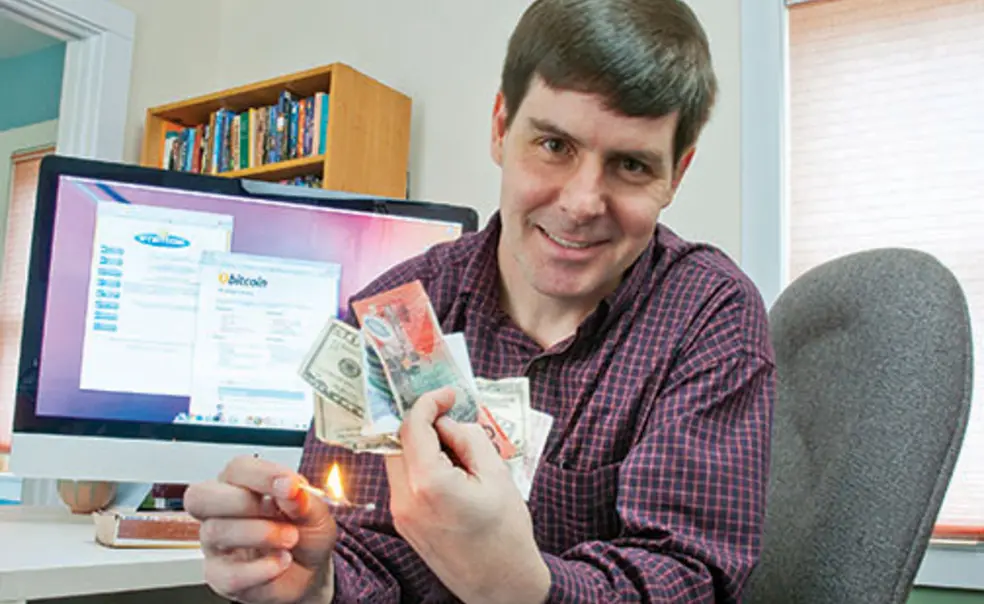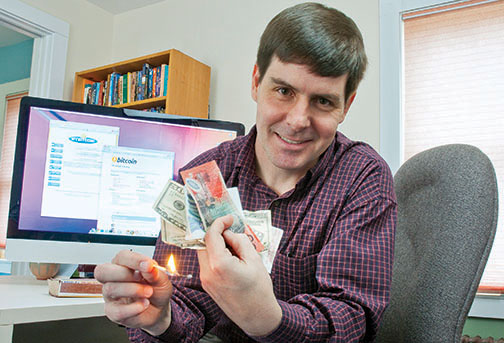Buying into Bitcoin
Who needs dollars? Some tech-savvy users are adopting this ‘crypto-currency’
When software developer Gavin Andresen ’88 first learned about the decentralized digital currency Bitcoin in 2010, he was so enamored with the concept that he wanted to share it with the world. So he spent $50 on about 10,000 bitcoins and began handing them out, five at a time, through a website called the Bitcoin Faucet. “It turns out that giving things away for free is a good way to become pretty popular,” he jokes.
The five bitcoins, worth pennies at the time, trade for more than $700 today. As chief scientist of the Bitcoin Foundation, Andresen (who was known as Gavin Bell at Princeton) now leads the development of the open-source computer code that supports bitcoin transactions. His salary, appropriately, is paid in bitcoins.
Bitcoin is a “crypto-currency,” managed by cryptography and set in motion by its creator, who uses the pseudonym Satoshi Nakamoto. The supply of bitcoins grows on a pre-determined schedule, with the number of newly generated coins declining over time. Users hold their bitcoins in password-protected digital “wallets” and use private “keys” to unlock and transfer funds from wallet to wallet over a computer network.
To the uninitiated, the concept of a currency that is not issued by any government or central authority may be hard to grasp, and one of Bitcoin’s challenges, Andresen says, will be to expand beyond its existing group of tech-savvy users. Even with limited adoption, the 4-year-old currency’s growth has been remarkable: As of Oct. 15, bitcoins in circulation had a total value of more than $1.8 billion, according to the Mt. Gox exchange, a website that facilitates the buying and selling of bitcoins. The price fluctuates more than traditional currencies, frequently changing by 5 percent in a day and occasionally taking more severe dips and jumps.
Because bitcoin transactions are anonymous, fans of the currency have included illicit enterprises such as online gambling sites and the underground drug-dealing market Silk Road. Andresen admits that the currency had some unsavory early adopters, but he adds that if it were a technology just for criminals, he would not be devoting his life to making it more efficient and secure.
Andresen points instead to Bitcoin’s practical benefits. This fall, he and his wife, Michele Cooke-Andresen ’89, are living in Australia. If they wanted to transfer Australian dollars to a friend at home in Massachusetts, the transaction would be a major headache. But the same international transfer is easy with bitcoins, he says, because there are no exchange rates or fees.
Bitcoin users can purchase real-world goods and services from hundreds of participating retailers, but familiar companies that accept the currency are few and far between. Andresen converts a significant portion of his salary into dollars and advises that people “only invest time or money in Bitcoin that you can afford to lose.”
Despite the volatility and uncertain future, Andresen says he is excited to hold a job that was unimaginable when he was an undergraduate at Princeton: “It definitely feels like I’m living in a science-fiction novel.”













No responses yet